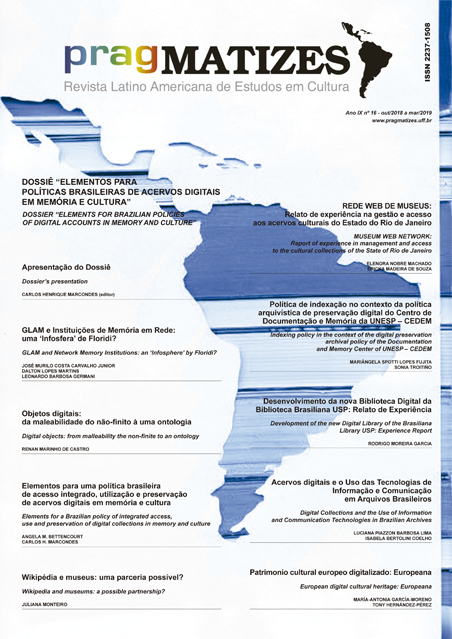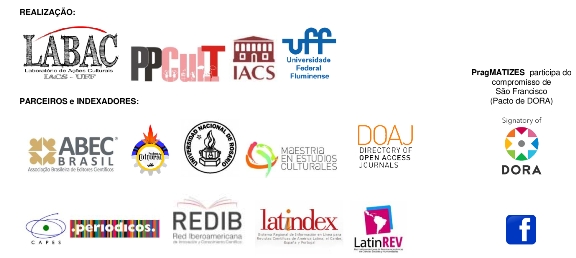¿GLAM e Instituciones de Memoria en Red: una ‘Infosfera’ de Floridi?
DOI:
https://doi.org/10.22409/pragmatizes.v0i16.27529Resumen
La Ciencia de la Información participa en la promoción del término
‘Institución de Memoria’ como metáfora para la integración de
bibliotecas, archivos, museos y centros de documentación. Una de las
intenciones asumidas fue la de alentar una visión coherente sobre los
recursos informativos que los acervos de tales instituciones provienen.
En paralelo, a partir del movimiento en integrar acervos digitalizados
del campo de la cultura en red emerge el acrónimo GLAM de la lengua
inglesa, que integra Galerías, Bibliotecas, Archivos y Museos, y enfatiza
la promoción del acceso como misión principal. Es justo afirmar que
la demanda por la interoperabilidad de los acervos de los diferentes
dominios archivísticos está pautada por la posibilidad de integración
de los contenidos diversos vía web, escenario que propicia innovación
en el acceso y en el procesamiento de las informaciones de patrimonio
cultural por la sociedad. A partir de un enfoque en la reconstrucción
crítica de Richard Fyffe, sobre el papel del especialista en CI en la
perspectiva de la Infosfera de Floridi, buscamos identificar como nuevos
conceptos para el campo de la Ciencia de la Información, derivados
del FI y de la Ética de la Información (EI) de Floridi, pueden auxiliar la
comprensión de transformaciones radicales en curso en el campo de
los acervos digitalizados de instituciones de memoria, y su relación con
las cuestiones éticas más amplias en el plano de la Infosfera.
Descargas
Citas
AMERICAN ALLIANCE OF MUSEUMS. Code of ethics for museums. 2000. [citado por B. V. der Veer Martens / New grounds for ontic trust: Information objects and LIS] In AAM Website: http://www.aam-us.org/resources/ethics-standards-and-best-practices/code-of-ethics Acessado em: 18/01/2018
AMERICAN LIBRARY ASSOCIATION. Core values of librarianship statement. 2004. [citado por B. Van der Veer Martens / New grounds for ontic trust: Information objects and LIS]. In ALA Website: http://www.ala.org/advocacy/intfreedom/statementspols/corevalues. Acessado em: 18/01/2018
ARAÚJO, Carlos Alberto Ávila. Arquivologia, biblioteconomia, museologia e ciência da informação: o diálogo possível – Brasília, df : Briquet de Lemos / Livros / São Paulo : Associação Brasileira de Profissionais da Informação (abrainfo), 2014.
ASSOCIATION OF COLLEGE AND RESEARCH LIBRARIES. Framework for information literacy in higher education. 2015. [citado por B. Van der Veer Martens / New grounds for ontic trust: Information objects and LIS]. In ACRL Website: http://www.ala.org/acrl/standards/ilframework Acessado em: 18/01/2018
BARTHOLMEI, Stephan, Rachel Franks, James Heilman, Mylee Joseph, Vicki McDonald, Anna Raunik, Mia Ridge, and Mark Robertson. “Opportunities for Academic and Research Libraries and Wikipedia.” Columbus, Ohio, 2016. Available from: https://2016.ifla.org/wp-content/uploads/sites/2/2016/08/112-IFLAWikipediaAcademicandResearchLibrariesDiscussioDRAFT.pdf. Acessado em: 18/05/2018
BAWDEN, D. & ROBINSON, L. Into the infosphere: theory, literacy and education for new forms of document. In: M. Ivanovic & S. Tanackovic (Eds). Ogledi o informacijskim znanostima: Zbornik radova u Cast Tatjane Aparac-Jelusic. pp. 176-186. Osijek, Croatia.
BAWDEN, D. & ROBINSON, L. Curating the inphosfere: Luciano Floridi's Philosophy of Information as the foundation for Library and Information Science. Journal of Documentation. 2017.
BUCKLAND, Michael. What Kind of Science Can Information Science Be?, Journal of the American Society for Information Science and Technology. 2012. 63p (1) 1-7.
CUMMINGS, J. A simple guide to reusing media from Wikimedia Commons. Retrieved from https://commons.wikimedia.org/wiki/Commons:Simple_media_reuse_guide. 2016. Acessado em: 18/05/2018.
DALBELLO, M. Cultural Dimensions of Digital Library Development, Part I: Theory and Methodological Framework for a Comparative Study of the Cultures of Innovation in Five European National Libraries, Library Quarterly, 2008. 355-395p
DAY, Ronald E. Indexing it all. Cambridge (MA); MIT Press; [citado por B. Van der Veer Martens / New grounds for ontic trust: Information objects and LIS]. 2014.
ESS, Charles. Floridi's philosophy of information and information ethics: Current perspectives, future directions. The Information Society. 2009. 25(3), 159–168.
FLORIDI, Luciano. Information ethics: On the philosophical foundation of computer ethics. Ethics and Information Technology. 1999a. 1, 37–56.
FLORIDI, Luciano. Philosophy and computing: An introduction. New York: Routledge. [citado por B. Van der Veer Martens / New grounds for ontic trust: Information objects and LIS]. 1999b.
FLORIDI, Luciano. Information ethics: An environmental approach to the digital divide. Philosophy in the Contemporary World. 2001. 9(1), 1–7.
FLORIDI, Luciano. On defining library and information science as applied philosophy of information. Social Epistemology. 2002a. 16(1), 37–49.
FLORIDI, Luciano. On the intrinsic value of information objects and the infosphere. Ethics and Information Technology. 2002b. , 4, 287–304.
FLORIDI, Luciano. Four challenges for a theory of informational privacy. Ethics and Information Technology. 2006. 8(3):109–119. http://www.philosophyofinformation.net/
FLORIDI, Luciano. A look into the future impact of ICT on our lives. The Information Society, . 2007. 23, 59–64.
FLORIDI, Luciano. The philosophy of information as a conceptual framework. Knowledge, Technology and Policy. 2010. [citado por B. Van der Veer Martens / New grounds for ontic trust: Information objects and LIS] 23, 253–281.
FLORIDI, Luciano. A defence of constructionism: philosophy as conceptual engineering. Metaphilosophy, v. 42, n. 3, 282-304, 2011a. Disponível em: <http://www.philosophyofinformation.net/publications/pdf/adofpace.pdf> . [Citado por Maria Nélida Gonzalez / Luciano Floridi e os problemas filosóficos da informação: da representação à modelização] Acesso em: dez. 2012
FLORIDI, Luciano. The philosophy of information. Oxford: Oxford University Press, [Citado por Maria Nélida Gonzalez / Luciano Floridi e os problemas filosóficos da informação: da representação à modelização] 2011b.
FLORIDI, Luciano. The ethics of information. New York; Oxford University Press. 2013.
FLORIDI, Luciano. Perception and testimony as data providers. 2012. p 1-30. Pre-print. Disponível em: <http://www.philosophyofinformation.net/publications/pdf/patadp.pdf> [Citado por Maria Nélida Gonzalez / Luciano Floridi e os problemas filosóficos da informação: da representação à modelização] Acesso em: fev. 2013.
FLORIDI, Luciano. Google's ethic adviser: The law needs bold ideas to address the digital age - The Guardian-Technology, 2014a. Disponível em: <https://www.theguardian.com/technology/2014/jun/04/google-ethics-law-right-to-be-forgotten-luciano-floridi> . Acesso em: 19/01/2014
FLORIDI, Luciano. Google's privacy ethics adviser tour of Europe: a complex balancing act - The Guardian-Technology, 2014b. Disponível em: <https://www.theguardian.com/technology/2014/sep/16/googles-european-privacy-ethics-tour>. Acesso em: 19/01/2014
FLORIDI, Luciano. Google ethics tour: should readers be told a link has been removed? - The Guardian-Technology, 2014c. Disponível em: <https://www.theguardian.com/technology/2014/sep/29/google-ethics-tour-right-to-be-forgotten>. Acesso em: 19/01/2014
FLORIDI, Luciano. The right to be forgotten - the road ahead - The Guardian-Technology, 2014d. Disponível em: <https://www.theguardian.com/technology/2014/oct/08/the-right-to-be-forgotten-the-road-ahead> . Acesso em: 19/01/2014
FLORIDI, Luciano. Right to be forgotten: who may exercise power, over which kind of information - The Guardian-Technology, 2014e. Disponível em: <https://www.theguardian.com/technology/2014/oct/21/right-to-be-forgotten-who-may-exercise-power-information>. Acesso em: 19/01/2014
FLORIDI, Luciano. Right to be forgotten poses more questions than answers - in The Guardian-Technology, 2014f. Disponível em: <https://www.theguardian.com/technology/2014/nov/11/right-to-be-forgotten-more-questions-than-answers-google> . Acesso em: 19/01/2014
FLORIDI, Luciano. Right to be forgotten: A diary of the Google Advisory Council Tour - in philosophyofinformation.net, 2014g. Disponível em: <http://www.philosophyofinformation.net/right-to-be-forgotten-a-diary-of-the-google-advisory-council-tour/> . Acesso em: 19/01/2014
FYFFE, Richard. The value of information: Normativity, epistemology, and LIS in Luciano Floridi. portal: Libraries and the Academy. 2015. [citado por B. Van der Veer Martens / New grounds for ontic trust: Information objects and LIS]; 15(2): 267-86.
GONZALEZ, Maria Nélida. Luciano Floridi e os problemas filosóficos da informação: da representação à modelização. InCID: R. Ci. Inf. e Doc., Ribeirão Preto, v. 4, n.1, p. 03-25, jan./jun. 2013.
GLAM (Industry Sector). 04/12/2017. In Wikipedia, a Enciclopédia Livre. https://en.wikipedia.org/wiki/GLAM_(industry_sector) Acessado em 18/12/2018.
HACKING, Ian. The Social Construction of What? Cambridge (MA); Harvard University Press; [citado B.VdV Martens/New grounds for ontic trust:Information objects &LIS] 1999.
HERRIT, Robert. Google's Philosopher. in Pacific Standard, 2015. Disponível em: <https://psmag.com/environment/googles-philosopher-technology-nature-identity-court-legal-policy-95456> Acesso em: 19/01/2014
IBM Marketing Cloud. 10 Key Marketing Trends For 2017. 2017. Disponível em IBM Website: https://www-01.ibm.com/common/ssi/cgi-bin/ssialias?htmlfid=WRL12345USEN Pg 3. Acessado em: 18/01/2018
KNELL, S. J. The Shape of Things to Come: Museums in the Technological Landscape, Museum and Society, 2003. 132-146p
KOEHLER, W. Ethics and values in librarianship. Lanham (MD); Rowman and Littlefield; [citado por B. Van der Veer Martens / New grounds for ontic trust: Information objects and LIS] 2015. 242p
LEWIS, J. & HARMAND, S. An earlier origin for stone tool making: Implications for cognitive evolution and the transition to Homo. Philosophical Transactions of the Royal Society. [citado por B. Van der Veer Martens / New grounds for ontic trust: Information objects and LIS] 2016.
MARTENS, Betsy V. D. V.. An Illustrated Introduction to the Infosphere. Library Trends. 2015. 63. 317-361.
MARTENS, Betsy V. D. V.. New Grounds for ontic trust: Information objects and LIS. Education for Information, 33. IOS Press. 2017. 37-54
MARTINS, Dalton, CARVALHO JR., José Murilo. Memória como Prática na Cultura Digital. in TIC Cultura 2016. Comitê Gestor da Internet - São Paulo. 2017. 45-52p
Memory of the World: General Guidelines to safeguard documentary heritage / prepared for UNESCO on behalf of IFLA by Stephen Foster, Jan Lyall, Duncan Marshall and Roslyn Russel. - Paris : UNESCO, 1995. - viii, 77 p. ; 30 cm. - (CII-95/WS-l1)
OSBURN, Charcles. The social transcript: Uncovering Library Philosophy. Westport (CT); Libraries Unlimited; 2009. [citado por B. Van der Veer Martens / New grounds for ontic trust: Information objects and LIS] 228-229p
OXFORD Internet Institute. Luciano Floridi Appointed to Google’s Advisory Council on the Right to be Forgotten. 2014. In "News", Disponível em: <https://www.oii.ox.ac.uk/news/releases/luciano-floridi-appointed-to-googles-advisory-council-on-the-right-to-be-forgotten/>
PRODAN, Anca Claudia. The digital "Memory of the World": an exploration of documentary practices in the age of digital technology. 2014. Volume 3 of Heritage Studies - Walter De Gruyter Incorporated, 2016.
SOCIETY OF AMERICAN ARCHIVISTS - SAA. Core values statement and code of ethics. 2011. [citado por B. Van der Veer Martens / New grounds for ontic trust: Information objects and LIS]. In SAA Website: http://www2.archivists.org/statements/saa-core-values-statement-and-code-of-ethics Acessado em: 18/01/2018
UNESCO, “Memory of the World Register Companion”. Official Website of the Memory of the World Programme, 2011, http://www.unesco.org/new/fileadmin/MULTIMEDIA/HQ/CI/CI/pdf/mow/Register%20Companion.pdf Acessado em: 19/05/2018.
UNESCO, “Recommendation Concerning the Preservation of, and Access to, Documentary Heritage Including Digital Form”. Official Website of the Memory of the World Programme, 2015, https://en.unesco.org/sites/default/files/2015_mow_recommendation_implementation_guidelines_en.pdf Acessado em: 19/05/2018.
##submission.downloads##
Publicado
Cómo citar
Número
Sección
Licencia
Autores que publican en esta revista están de acuerdo con os siguientes términos:
- Autores mantienen los derechos autorales y conceden a la revista el derecho de propiedad, con el trabajo simultáneamente estando licenciado bajo Licencia Creative Commons Attribution que permite el compartimiento del trabajo con reconocimiento de la autoría y publicación inicial en esta revista.
- La revista se reserva el derecho de efectuar, en los originales, alteraciones de orden normativo, ortográfico y gramatical.
- Las pruebas finales no serán presentadas a los autores.
- Las opiniones emitidas por los autores son de su exclusiva responsabilidad.



